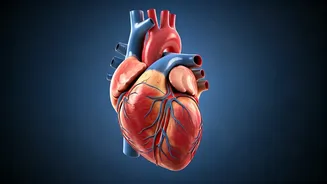Dietary Pitfalls Uncovered
While consistent physical activity is undoubtedly advantageous for cardiovascular wellness, the significance of dietary choices should not be underestimated.
A diet laden with processed foods, unhealthy trans fats, and excessive sugar intake can negate the benefits derived from regular exercise. Over time, such dietary patterns can contribute to the accumulation of plaque within the arteries, thereby impeding blood flow and elevating the risk of heart disease. Therefore, integrating a balanced and heart-healthy dietary approach alongside exercise is crucial for sustained cardiovascular well-being. This proactive strategy ensures that the body receives essential nutrients, diminishes harmful intake, and supports long-term heart health.
Overtraining Without Breaks
The drive to achieve fitness goals can sometimes lead individuals to push their bodies beyond reasonable limits. Overtraining, characterized by intense physical activity without adequate rest periods, can trigger a cascade of adverse physiological effects. One notable consequence is the elevation of stress hormones, particularly cortisol. Chronically high cortisol levels contribute to increased inflammation within the body, placing additional strain on the heart. It is imperative to incorporate sufficient recovery periods and rest days into one's fitness regimen to allow the body to repair itself and mitigate the potential risks associated with overtraining. This approach helps maintain a balance and fosters long-term cardiac health.
Endurance Training's Impact
While endurance training offers many health advantages, especially when it comes to cardiovascular fitness, long-term participation in intense endurance workouts can introduce structural changes to the heart. Events like marathon running, which demand sustained physical effort over an extended period, can affect the heart's anatomy. These alterations may elevate the risk of atrial fibrillation, a condition characterized by an irregular and often rapid heartbeat. Recognizing these potential consequences underscores the importance of a well-rounded fitness approach that integrates various exercise types, including rest and recovery, to support heart health holistically. This strategic balance ensures that the benefits of exercise are optimized while minimizing potential risks.
Hidden Genetic Factors
Sometimes, factors beyond lifestyle choices can affect heart health. Genetic predispositions and underlying health conditions can silently affect heart health, even in fit individuals. Certain conditions, such as hypertension (high blood pressure) and elevated cholesterol levels, may not manifest noticeable symptoms early on. However, if unmanaged, they can significantly increase the risk of cardiovascular events. Regular check-ups and medical evaluations are essential for early detection and intervention. Such proactive measures can help manage and control these conditions, thereby reducing their impact on heart health. Combining these efforts with a healthy lifestyle creates a strong foundation for long-term cardiovascular well-being.
Importance of Recovery
The body's ability to repair and rejuvenate itself is crucial for overall health and is particularly relevant to cardiovascular well-being. Ignoring the needs of the body, such as sleep and recovery, can undermine its ability to repair itself effectively. Inadequate sleep or failing to schedule enough recovery days can hinder the heart's natural repair mechanisms. This can make it more susceptible to arrhythmias (irregular heartbeats) and accelerate fatigue. Prioritizing quality sleep and incorporating rest and recovery days into one's exercise routine is not merely beneficial; it's essential for maintaining optimal heart health. This approach permits the heart to recover, function efficiently, and contribute to long-term well-being.
Warning Signs to Watch
Being attuned to the body's signals is key to maintaining good health, particularly when it relates to cardiovascular well-being. Specific symptoms should not be ignored. Chest tightness or any discomfort in the chest area can indicate underlying cardiac issues and should be evaluated promptly. Shortness of breath or instances of dizziness during workouts are additional red flags that necessitate immediate attention from healthcare professionals. Being vigilant and responsive to these warning signs is crucial, as early detection can play a crucial role in preventing or mitigating serious cardiac problems. Addressing any concerns promptly ensures timely intervention and helps preserve heart health.













